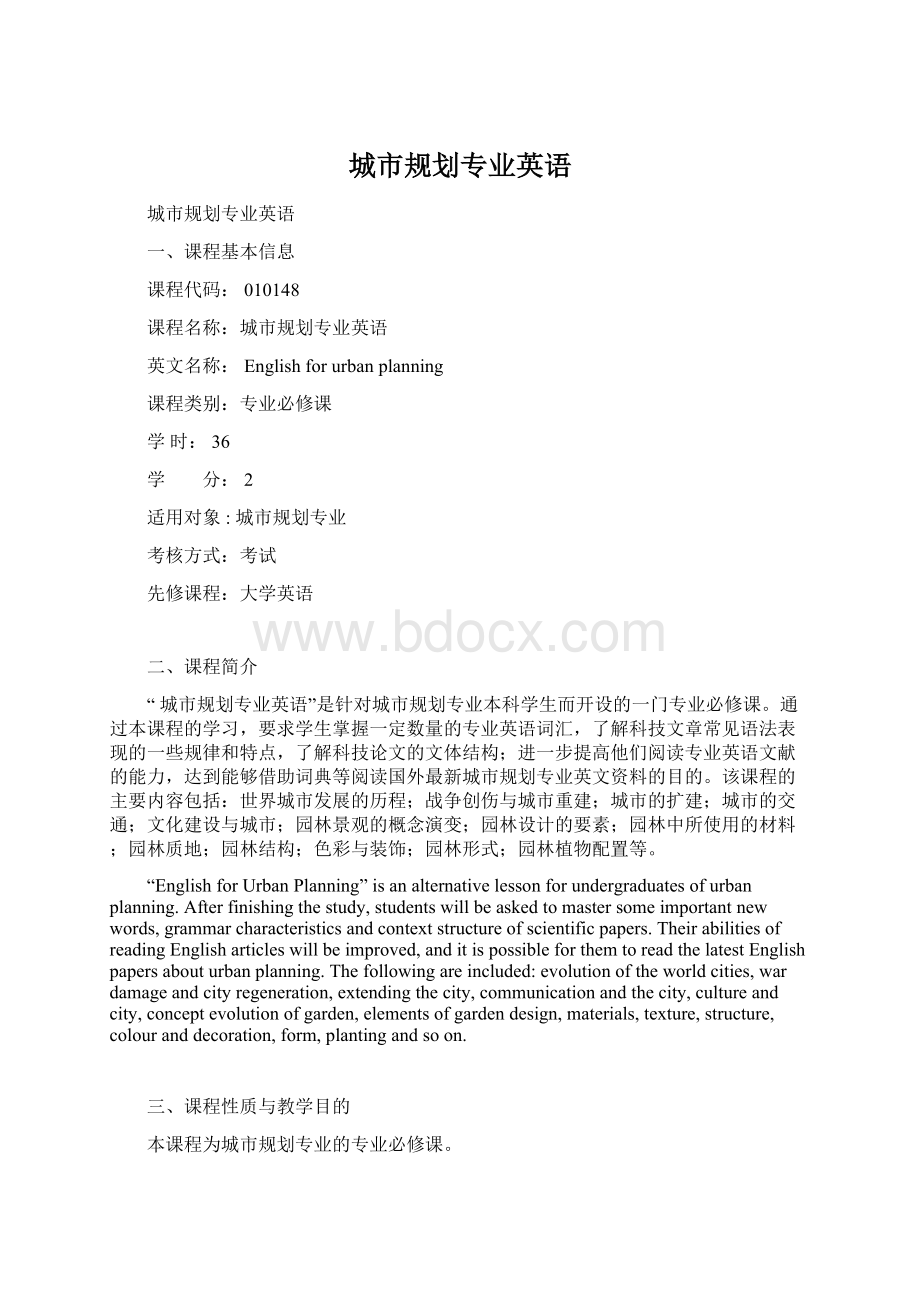城市规划专业英语文档格式.docx
《城市规划专业英语文档格式.docx》由会员分享,可在线阅读,更多相关《城市规划专业英语文档格式.docx(24页珍藏版)》请在冰豆网上搜索。

evolutionoftheworldcities,wardamageandcityregeneration,extendingthecity,communicationandthecity,cultureandcity,conceptevolutionofgarden,elementsofgardendesign,materials,texture,structure,colouranddecoration,form,plantingandsoon.
三、课程性质与教学目的
本课程为城市规划专业的专业必修课。
四、教学内容及要求
第一课Introduction
•目的与要求
•了解城市的发展历程;
•了解世界各国在城市化进程中所面临的主要问题;
•城市建筑如何与城市的风格统一;
•掌握有关城市化以及建筑等方面的专业词汇。
•教学内容
1、主要内容
•现代城市的内涵;
•人类社会的发展趋势就是城市化;
•城市化过程中所产生的污染对人类的生存造成了巨大的威胁;
•建筑在城市化进程中具有独特的地位。
•城市是一个消费中心,而不是一个生产中心;
•二战后受害城市的重建以及发展。
2、概念和知识点
futureofthecity;
urbanbeing;
environmentalprotection;
civilizedorder;
idea-citylife;
challengetosocialstability;
IndustrialRevolution;
multiculturalcity;
lifestyle;
urbanarchitecture;
moderncity;
urbanplanning;
urbanism;
traditionalarchitecture;
inhabitant;
rationaleofurbandevelopment;
zoning;
megalopolis;
regeneration;
signaturearchitect;
suburbia;
“TheDeathandLifeofGreatAmericanCities”.
3、问题与应用(能力要求)
•不同国家的城市化进程有何特点?
•人类历史上,在城市化进程中出现了哪些主要问题?
在未来的城市化中如何避免或解决?
•建筑在城市化中所起的作用如何?
•掌握本课所学的重要的专业词汇;
•能够比较流利的朗读课文。
•实践环节与课后练习
•查阅指定的教学参考书;
•熟练掌握本课所学的专业词汇;
•思考上面所提出的问题;
•加强朗读训练。
•教学方法与手段
以课堂讲授为主。
辅之以课堂朗读、课堂提问、课堂分组讨论等。
第二课Concept
(一)目的与要求
1、了解景观(园林)设计的概念和内涵;
2、了解景观(园林)设计与艺术、文化、科学等之间的辨证关系;
(二)教学内容
(1)景观(园林)设计的概念及其内涵;
(2)景观(园林)设计的发展历史;
(3)景观(园林)与建筑的关系。
landscapeandgardendesign;
designer;
site;
location;
personality;
context;
evolutionofgardendesign;
plant-ledcomposition;
senseofplace;
subconscious;
conscious;
reconcile;
client;
inspiration;
synthesis;
communication;
boundarybetweenartanddesign;
spatialmanipulation;
sculpture;
balancebetweensolidandvoid;
“GroundsforChange:
MajorGardensoftheTwentiethCentury”;
“ArtintoLandscape,LandscapeintoArt”.
(1)景观设计概念在西方的演变过程;
(2)哪些因子对景观设计有不同程度的影响?
(3)日本园林有什么特点?
(4)掌握本课所学的重要的专业词汇;
(5)能够比较流利的朗读课文。
(三)实践环节与课后练习
1、查阅指定的教学参考书;
2、熟练掌握本课所学的专业词汇;
3、思考上面所提出的问题;
4、加强朗读训练。
(四)教学方法与手段
第三课ElementsofGardenDesign
1、掌握景观(园林)设计的基本原则;
2、了解景观(园林)设计的不同风格;
3、掌握景观(园林)设计的主要元素。
(1)景观(园林)设计的基本原则;
(2)景观(园林)设计的主要元素;
(3)景观(园林)设计的不同风格;
designprinciple;
elements;
composition;
shape;
unity;
balance;
interest;
rhythm;
movement;
patio;
plantcolour;
hardlandscaping;
clip;
greenhedge;
geometriclayout;
transition;
formality;
symmetry;
asymmetry;
man-madestructure;
plantcombination;
verticalelement;
low-maintenanceplant;
hedge-trimmer.
(1)景观设计基本原则有哪些?
(2)景观设计中包含有哪些要素?
(3)规则式庭园有什么特点?
(4)景观设计的常见风格有哪几种?
(5)掌握本课所学的重要的专业词汇;
(6)能够比较流利的朗读课文。
第四课Materials
1、了解景观(园林)设计中常用的材料;
2、了解在景观(园林)设计中如何就地取材。
(1)景观(园林)设计师在设计中如何就地取材;
(2)景观(园林)设计中常用的材料;
(3)景观(园林)设计中常用的材料如何与周围的景观相协调。
material;
exploit;
ArtsandCraftsMovement;
archetypalfeature;
partner;
inspire;
surrounding;
blessedwith;
photographicmemory;
drinkin;
vernaculararchitecture;
application;
architecturalquality;
interpretation;
vernaculartradition.
(1)景观(园林)设计师如何就地取材的?
(2)景观(园林)设计中常用的材料有哪些?
(3)景观(园林)设计中所用的材料如何做到与周围的景观相协调?
第五课Texture
1、掌握景观(园林)设计中材料“质地”的内涵;
2、了解景观(园林)设计中如何处理材料的表面质量;
3、了解植物修剪对景观(园林)效果的影响。
(1)景观(园林)材料“质地”的内涵;
(2)如何合理配置景观(园林)材料中的“硬”与“软”;
(3)园林植物的修剪对景观效果的影响。
texture;
expressiveaspect;
ingredient;
surfacequality;
tactileexperience;
plantingdesign;
roofgarden;
three-dimensionalquality;
driftingcolour;
foliagetexture;
harmony;
asymmetricbalance;
texturalcontrast;
culturalcombination;
hardandsoftmaterial;
simplification;
originalidea;
over-designing.
(1)什么是园林的表面质量?
(2)如何进行园林的表面质量的处理?
(3)什么是园林材料的“硬”与“软”?
(4)“质地”的内涵是什么?
第六课Colour&
Decoration
1、掌握植物色彩在景观(园林)设计中的应用;
2、了解景观(园林)设计中的植物配置;
3、了解植物色彩对景观(园林)效果的影响。
(1)植物色彩的内涵;
(2)在景观(园林)设计中的植物配置;
(3)在景观(园林)设计中的植物色彩的应用。
plantingcolourandtexture;
decorator;
warmredsandoranges;
coolbluesandpurples;
decorativeskill;
cottage-gardenplanting;
lifestylegarden;
colourborder;
decorativeplanting;
luxuriantcolourplanting;
herbaceousborder;
plantsmanship;
(1)什么是植物色彩?
(2)景观(园林)设计中如何进行植物配置?
(3)什么是植物色彩的“暖”与“冷”?
第七课Planting
1、了解在景观(园林)设计中的植物设计;
2、掌握植物设计中的美学、生态学、园艺学原则;
(1)植物设计的发展历程;
(2)在景观(园林)设计中的植物设计;
(3)在景观(园林)设计中的植物设计的应用。
plantcollecting;
plantdesign;
trophy;
sculpturalimpact;
sustainability;
formalist;
naturalisticschool;
axiallayout;
senseofcontrol;
indigenous;
colourtheory;
penetrate;
plant-orientatedgardening;
clippedform;
box;
yew;
hornbeam;
organicplantingstructure;
horizontalhedge;
herbaceousperennial;
hosta;
fatsia;
acanthus;
fern;
bamboo;
texture;
naturalisticconcept;
ecologicalphilosophy;
partnership;
ecosystem;
integrate;
breathtakingbeauty;
plantingstyle;
topiary;
soulofplant;
environmentalawareness.
(1)什么是植物设计?
(2)景观(园林)设计中如何进行植物设计?
(3)植物设计如何与美学、生态学相结合?
第八课Artichoke
1、了解朝鲜蓟是一种兼具观赏与食用价值的植物;
2、了解朝鲜蓟的田间生产管理;
(1)朝鲜蓟的生物学特性;
(2)朝鲜蓟的观赏与食用价值;
(3)朝鲜蓟的田间生产与管理(播种、收获等);
(4)朝鲜蓟的常见品种。
artichoke;
perennial;
sunflowerfamily;
violet-blue;
flowerbud;
terminalbud;
croppingcycle;
peakseason;
labour-intensive;
coolweatherplant;
lateralbranch;
balancedfertilizer;
harvest;
variety;
mature.
(1)朝鲜蓟的原产地在哪?
(2)为什么说朝鲜蓟是一种观赏与使用兼备的植物?
(3)朝鲜蓟的生物学特性如何?
(4)作为蔬菜,朝鲜蓟为何深受人们喜爱?
(5)常见的朝鲜蓟品种有哪些?
(6)掌握本课所学的重要的专业词汇;
(7)能够比较流利的朗读课文。
第九课HealingtheCity
1、了解战争给城市带来的创伤;
2、了解战后城市的重建。
(1)第二次世界大战给世界主要城市带来的破坏;
(2)受破坏城市的重建;
(3)不同城市的重建效果各不相同。
heal;
TheSecondWorldWar;
ruin;
inherentstrength;
reconstruction;
goldenera;
decentralization;
campaign;
crusade;
urbanclearance;
waterfront;
leisure;
urbanroutine;
warfare;
post-warperiod;
legislation;
.
(1)为什么说20世纪的城市历史常常是悲剧性的?
(2)遭破坏的城市为什么常常能够快速地医治战争的创伤?
(3)遭破坏的城市是如何进行重建的?
(4)掌握本课所学的重要的专业词汇;
第十课SEATTLE:
CityCentreRegenerationProjects(1997--)
1、了解西雅图的城市中心重建工程;
2、了解文化、体育设施在城市重建过程中的重要性。
(1)西雅图市所具有的地理区位、人才等优势;
(2)西雅图市在城市重建过程中所采取的主要措施;
(3)在在城市重建过程中如何调整、发挥城市原有基础设施的作用。
citycentre;
immune;
livable;
project;
credit;
inner-city;
ally;
investment;
culturalandleisureindustry;
catalyst;
retractableroof;
light-railnetwork;
transportinterchange;
perception;
storefront;
middle-incomefamily;
low-costhousing;
accommodate;
asset.
(1)西雅图市在美国的城市中具有什么优势?
(2)西雅图市的城市中心重建的主要内容有哪些?
(3)掌握本课所学的重要的专业词汇;
(4)能够比较流利的朗读课文。
第十一课ExtendingtheCity
1、了解城市规划在城市扩展中的重要性;
2、了解城市扩展的内涵。
(1)城市的无序扩展所带来的诸多问题;
(2)城市规划对于城市扩展来说至关重要;
(3)不同城市的扩展具有各自的特点。
extend;
dweller;
poorhousing;
overcrowded;
industrialpollution;
unplannedgrowth;
uncontrolledsprawl;
individuality;
masterplan;
idiosyncratic;
urbancharacter;
publictransportlink;
priority;
strategy;
civility;
atallcost.
(1)城市的无序扩展会带来什么问题?
(2)为什么说城市规划对于城市扩展来说至关重要?
(